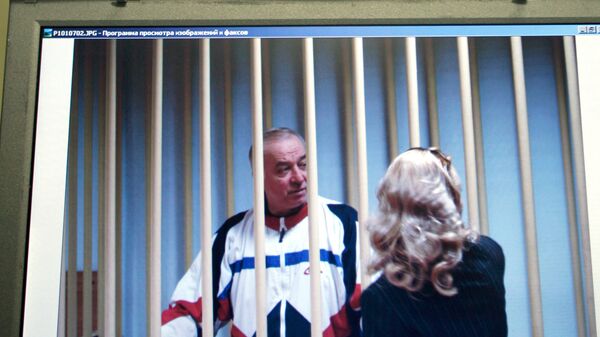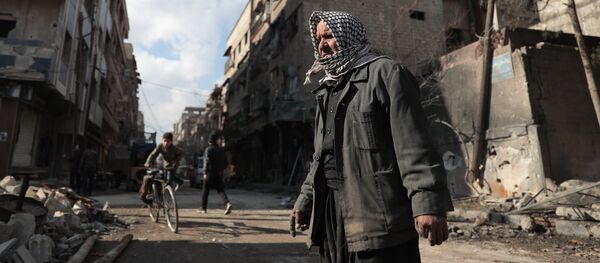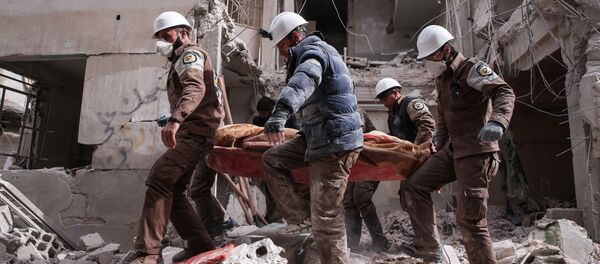Washington is seeking to drive a wedge between Moscow and Ankara by resuming the discussion over the Khan Sheikhoun chemical incident, Somar Saleh, a Syria researcher at the Center of Strategic Studies, told Sputnik Arabic, adding that the US may also try to weaponize the poisoning of former spy Sergei Skripal in the UK.
"The [alleged] use of chemical weapons in Khan Sheikhoun is again being discussed in order to force Russia to take retaliatory measures," Saleh opined. "Britain, France and the US insist that Russia should support the initiative to conduct a special investigation in Syria."
"We expect all parties involved to live up to their promise in 2013 and to ensure that the Assad regime stops its senseless use of chemical weapons against the Syrian people," the statement said.
However, although a year has passed since the event, no evidence has been presented so far to confirm the claim.
The alleged use of chemical weapons in Khan Sheikhoun, Idlib province, on April 4, 2017 prompted a "retaliation" strike on the part of the US. Washington attacked the Syrian Arab Army's (SAA) Shayrat airfield with Tomahawk missiles on April 7, despite the fact that no inquiry had been conducted into the matter.
Probe Into Syria Chemical Incident 'Inseparable' From Skripal Case
Saleh suggested that if Russia refuses to participate in the investigation initiated by Western countries it would be subjected to an information attack. One would suspect that Russia was somehow involved in the episode, he presumed, adding that the West may use the Skripal poisoning case to try to exert further pressure on Moscow.
At the same time, the new investigation may expose Turkey's ties with militants in Idlib. In this context the Khan Sheikhoun chemical case could be presented as Russia's attack against the Turkish-backed forces in order to cast a shadow over the Russian-Turkish strategic alliance, Saleh believes.
"The investigation into the chemical weapons incident in Syria is inseparable from the incident with Sergei Skripal," Saleh opined. "The examination [of the chemical substance] in London showed that it is impossible to find out where exactly the toxic agent A-232 was produced. However, it is clear that many [in the West] want to pin the blame on Russia. Now let's return to Syria. It is known that all stocks of chemical weapons have been destroyed in Syria. Then where did the chemical agents come from? According to the British plan, they want to blame Russia for it."
On March 4, former spy Sergei Skripal and his daughter Yulia were reportedly attacked with the A-234 nerve agent in Salisbury, England. London rushed to point the finger of blame at Russia citing no solid evidence to back the allegations. The incident prompted a UK-orchestrated diplomatic row which resulted in the expulsion of more than 100 Russian diplomats from over 20 countries, despite the fact that the investigation into the case had not been over. According to British media reports, the Skripals are currently out of critical condition.
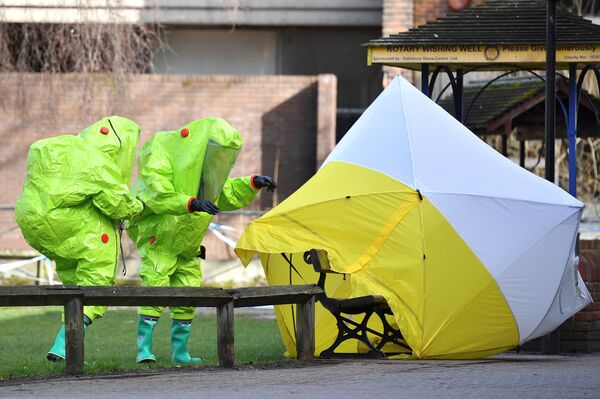
US 'Needs Escalation of Tensions in Syria for Several Reasons'
For his part, Syrian military-strategic analyst Hasan Hasan believes that the US attempt to play the chemical weapon card could be used to shatter the established status quo in the region and accuse Russia of failure in its fight against terrorism.
"I think that [the US] needs the recent escalation of tension in Syria for several reasons," Hasan said. "First, to show that there will be no easy victory over terrorism. Second, [they want] to prevent the stabilization of the situation. Third, [they seek] to show the world that all international organizations are controlled by the United States. The only exception is the UN Security Council, because Russia and China can veto its decisions."
To illustrate his point, he referred to the White Helmets organization: "Let's take a look at the White Helmets, which was created by a British intelligence officer. What can you expect from it?"
However, the Syrian military strategist believes that the US-led alliance will not be able to use the chemical weapon card to its advantage, since Russia and China could veto its efforts.
"Therefore, [Western countries] have nothing left, except threats and escalation of the situation on the battlefield," Hasan Hasan suggested. "Previously, [President] Vladimir Putin said that Russia's armed forces are capable of repelling any aggression, protecting their country and [Russia's] allies."
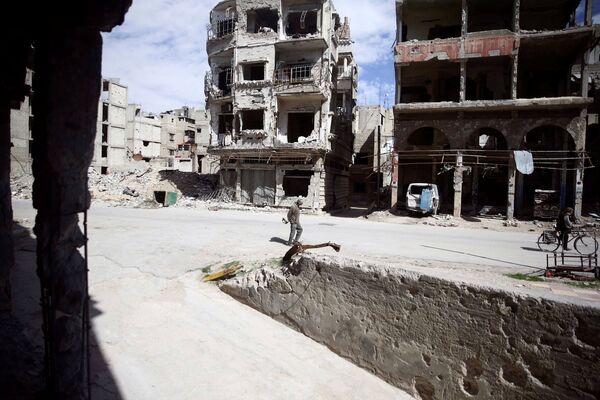
Alleged Chemical Attack in Douma
On April 7 several media outlets, citing jihadi militants, accused the Syrian government of conducting a chemical attack in the town of Douma in Syria's Eastern Ghouta.
The next day US President Donald Trump condemned Syrian President Bashar al-Assad, Russia and Iran for the supposed use of chemical weapons.
Many dead, including women and children, in mindless CHEMICAL attack in Syria. Area of atrocity is in lockdown and encircled by Syrian Army, making it completely inaccessible to outside world. President Putin, Russia and Iran are responsible for backing Animal Assad. Big price…
— Donald J. Trump (@realDonaldTrump) 8 апреля 2018 г.
The Russian Ministry of Defense denied the allegations spread by the jihadi-linked NGOs, including the White Helmets, and cited the fact that medics of Syrian Douma had received no patients with signs of chemical poisoning. Similarly, the Syrian Red Crescent Society told Sputnik on Monday that it had not recorded any cases of poisoning caused by a chemical attack in the past two days.
Earlier, on April 6, the spokesperson for the Russian Ministry of Defense Yuriy Evtushenko warned that militants plan provocations with the use of toxic substances in Syria, citing sources on the ground.
Meanwhile, Trump signaled during a cabinet meeting on April 9 that "major decisions on Syria" will come in the next 24 to 48 hours and remarked that the military option against Syria is not "off the table."
The views and opinions expressed by the contributors do not necessarily reflect those of Sputnik.

